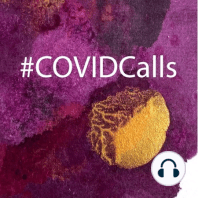68 min listen
#15 COVIDCalls 4.3.2020 - Part 2 - Pandemic Perspectives: South Korea
FromCOVIDCalls
ratings:
Length:
62 minutes
Released:
Jun 1, 2020
Format:
Podcast episode
Description
Part Two:
What accounts for the starkly different pictures of the pandemic in various nations and what can we learn from the example of South Korea? How was South Korea able to respond and, as of April 2, 2021, report only 174 deaths due to COVID-19?
Dr. Seung-sik Hwang, a professor of epidemiology at Seoul National University, and Dr. Chihyung Jeon, an associate professor and department head at the Graduate School of Science and Technology Policy at the Korean Advanced Institute of Science and Technology (KAIST), both discuss South Korea’s comparative success in responding to COVID-19 and the lessons it offers the United States. Together they discuss the success of the testing and contract tracing regime in South Korea, particularly around the case of “Patient 31” in the city of Daegu. Also discussed is how the experience of the Sewol Ferry disaster in 2014 and MERS Outbreak in 2015 in South Korea affected the government’s response to COVID-19. Ultimately Dr. Hwang emphasizes the importance of testing and contract tracing for preserving the healthcare system in a given country. Dr. Jeon also explains the inseparability of science and politics and the need to think about their relationship wisely during a crisis.
For further reading:
“What We Can Learn from the Korean Response to COVID-19”
“How a South Korean church helped fuel the spread of the coronavirus”
What accounts for the starkly different pictures of the pandemic in various nations and what can we learn from the example of South Korea? How was South Korea able to respond and, as of April 2, 2021, report only 174 deaths due to COVID-19?
Dr. Seung-sik Hwang, a professor of epidemiology at Seoul National University, and Dr. Chihyung Jeon, an associate professor and department head at the Graduate School of Science and Technology Policy at the Korean Advanced Institute of Science and Technology (KAIST), both discuss South Korea’s comparative success in responding to COVID-19 and the lessons it offers the United States. Together they discuss the success of the testing and contract tracing regime in South Korea, particularly around the case of “Patient 31” in the city of Daegu. Also discussed is how the experience of the Sewol Ferry disaster in 2014 and MERS Outbreak in 2015 in South Korea affected the government’s response to COVID-19. Ultimately Dr. Hwang emphasizes the importance of testing and contract tracing for preserving the healthcare system in a given country. Dr. Jeon also explains the inseparability of science and politics and the need to think about their relationship wisely during a crisis.
For further reading:
“What We Can Learn from the Korean Response to COVID-19”
“How a South Korean church helped fuel the spread of the coronavirus”
Released:
Jun 1, 2020
Format:
Podcast episode
Titles in the series (100)
#14 COVIDCalls 4.2.2020 - Care, Grieving, Parents, & Children in the Pandemic: How is ageism influencing debates over whether or not to “re-open” the nation amidst rising infections and economic fall out? What does caring for the elderly during the pandemic look like during the early pandemic? How is COVID-19 affecting how and what... by COVIDCalls
